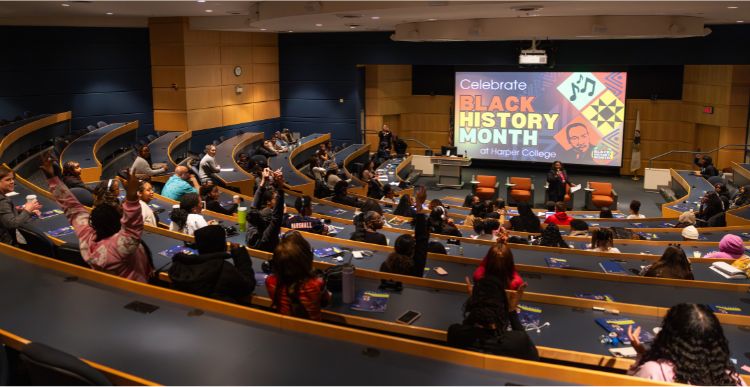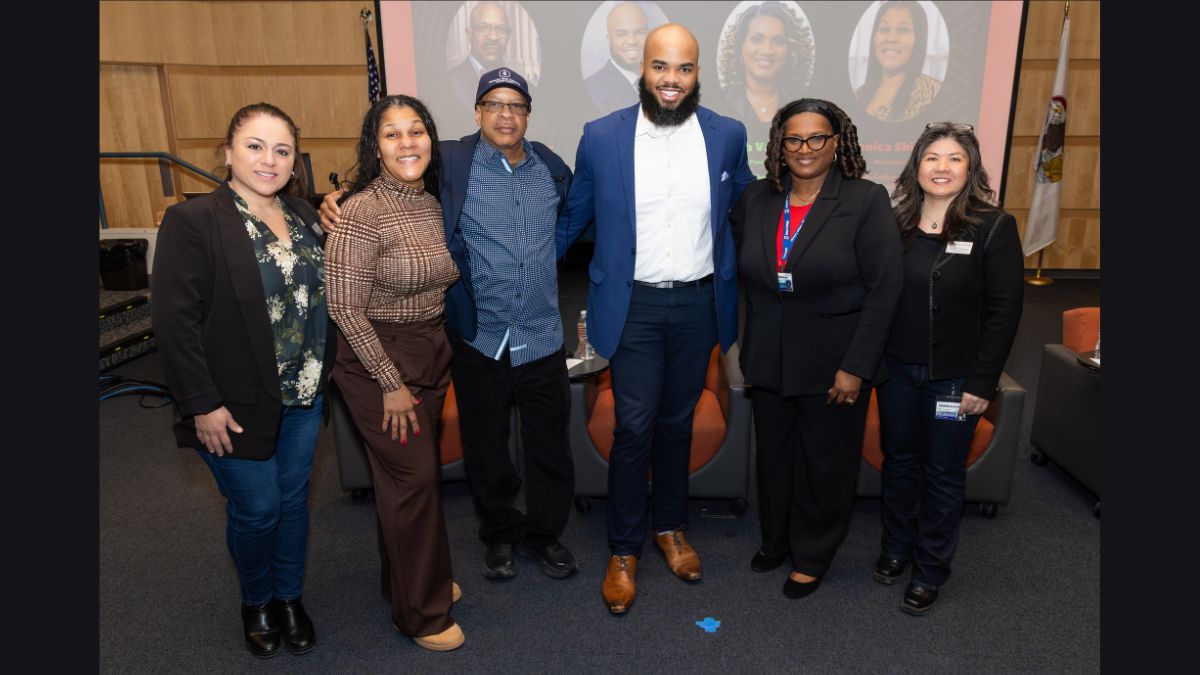Photo credits: Harper College photographer Michael Hubatch
Throughout the 20th century, innovation has evolved in ways that continue to shape our world, and this transformation will accelerate in the years ahead.
Harper College in Palatine hosted a Black History Month event, “Black Futures: Inspiration to Innovation in Emerging Tech,” highlighting the contributions of Black leaders in technology. The event featured a panel of industry professionals, including Michael Crawley, William Smith, Angela Valentine, and Monica Shirley. Local high school students from Rolling Meadows, Palatine, and surrounding areas were invited to attend, engage in discussions and explore tech career opportunities.
A dedicated educator, Angela Valentine, welcomed the students and underlined the event’s goal of offering valuable insights, especially in tech.
“Our goal is to provide you with valuable information and resources that will inspire and empower you, particularly in technology,” she stated.
Technology History and Leaders
In a PowerPoint slide, Valentine highlighted the achievements of several African-American pioneers who significantly contributed to technology and innovation. These included Granville T. Woods, who, with over 50 patents, developed the telegraph system for train communication, and Garrett Morgan, who invented the gas mask and improved the traffic signal. Dr. Charles Drew revolutionized blood storage, and Katherine Johnson’s mathematical expertise was crucial to NASA’s space program.
Valentine also encouraged students to reflect on the Black history figures they looked up to.
“Who are your Black history heroes?” she asked. Valentine advocated for everyone to explore their family’s history, reminding them that Black history isn’t only about the well-known figures in textbooks. She also said it is also essential to know “your personal history.”
Moderator Monica Shirley, Student Diversity Initiatives Coordinator, introduced Michael Crawley, a globally recognized expert in the future of education, work and workforce development. As the President and CEO of the Kaizen Future of Work Institute, Crawley is committed to improving learning and professional environments through ethical AI and innovation.
In a recent talk, Crawley shared his story, reflecting on his roots in Brooklyn and the Bronx. Despite growing up in a resource-limited environment, he found inspiration in the rise of hip-hop. “I remember before there were records, the DJs would set up their turntables outside, and that’s where it all started,” he said, describing the birth of hip-hop with its battles, crowds and movements.
Crawley stressed the importance of critical thinking and problem-solving, highlighting their key roles in academics and the workforce. “If you know how to think critically and solve problems, you’ll always add value.” His early interest in technology led him to pursue a degree in information technology at Howard University, an HBCU.
He also strongly advocated recognizing global Black history, stating, “Black history is world history. It’s not just about the U.S. — it’s about the global contributions of Black people, who helped build the economics and power of this country through labor.”
AI strategist William Smith is a digital transformation expert with extensive experience spanning over a decade, having worked with companies like Microsoft. He authored “Future Tech” and is currently the Chief Tech Office at WSC, advocating for diversity in tech and ethical AI.
Smith shared his story: “I grew up in a home without my dad, and I had to lean on positive role models.” He stressed the importance of resilience: “You have to face challenges head-on and keep moving forward.” Smith’s tech career started as a developer at JPMorgan. “I might not look like a typical coder, but I’ve been in tech for a long time,” he stated. Despite being a talented football player with a scholarship, Smith switched to tech when he stepped up to care for his sick grandmother. “Technology became my way forward.”
Smith’s advice to the next generation is simple: “You’ve got to have a fire inside you—something that motivates you. Be a positive force, and don’t let anything hold you back. Life isn’t perfect, and neither are you. Just keep moving forward.”

Photo credits: Harper College photographer Michael Hubatch
Looking to the future, Smith encouraged “Network relentlessly,” explore AI, and dive into emerging fields like quantum computing, adding, “The next decade in tech is going to be intriguing and incredible.
Valentine has years of experience in corporate telecommunications, specializing in training, compliance and business ethics. Now, as a consultant and instructor, she helps create professional training programs to help others discover their purpose and use technology to thrive.
Reflecting on tech innovators, Valentine shared overcoming personal challenges is possible. She shares a poignant story about her father, who was killed in the Vietnam War, and how her grandparents raised her with the belief that she would go to college.
Angela recalls her college experience: “I was on my own, no friends, no plan, but I chose to stay and figure it out.” She shares a time when she couldn’t afford tuition, but her 3.9 GPA led to a scholarship. “The lesson: just show up. Even if you don’t know what’s going on, be there. Opportunities come when you show up.”
AI Technology: Is it okay to use?
Today, AI is at the forefront of innovation, functioning like a human brain and enabling computers to perform tasks that typically require human intelligence. AI mimics human thought processes using algorithms, data, and computational power. With these advancements, the question becomes: Who will guide our communities through this new tech era?
AI is a powerful tool, but it’s crucial to use it ethically. Always be transparent about when you’re using it, and exercise caution, especially with free AI tools.
Smith made a key point about AI, particularly in the context of “AI and learning courses.” As students, developing strong relationships with your school and instructors is crucial while building key skills. “When I talk to employers, one of the most common skills they look for is the ability to use AI effectively.”
A Harper Team member told the group of students, “Teachers will likely want to see your prompts, outputs, and how you’ve modified them. If using AI for an assignment makes you uncomfortable or unsure about sharing it with your teacher, it might be an ethical concern. However, it’s perfectly fine if your instructors know you’re learning AI. Trust your instincts if you feel uneasy about using AI for a school assignment. If it feels wrong, it probably is.”
Student Questions
At the end of the program, the students ask two important reflective questions: “What jobs would you recommend for young Black students in the AI field? “How do you handle situations when other ethnicities, especially of the Caucasian race of people, try to bring you down, especially when you want to speak up?”
For the job question, Smith stated, “Security is crucial—protecting against AI misuse is a major challenge. Automation is another area; we need people who can create AI-driven solutions for business problems, often through consulting. QA testing is also important, ensuring applications work properly. So, Security, automation, and QA testing are solid paths.”
Valentine shared how to stand up for yourself against racial cruelty: “Don’t shrink back—use your voice. Excellence earns respect. Whatever you do, give it your all. And when you need to speak up, force yourself. Representation in AI is crucial—if we’re not in the room, AI won’t reflect our perspectives. Be there and be strong.”



